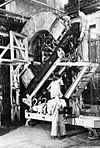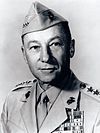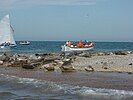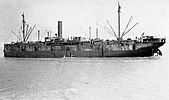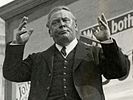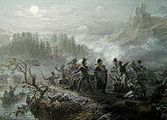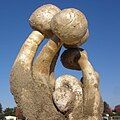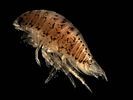Wikipedia:Today's featured article/September 2016
| << | Today's featured articles for September 2016 | >> | ||||
|---|---|---|---|---|---|---|
| Su | Mo | Tu | We | Th | Fr | Sa |
| 1 | 2 | 3 | ||||
| 4 | 5 | 6 | 7 | 8 | 9 | 10 |
| 11 | 12 | 13 | 14 | 15 | 16 | 17 |
| 18 | 19 | 20 | 21 | 22 | 23 | 24 |
| 25 | 26 | 27 | 28 | 29 | 30 | |
September 1
The passenger pigeon (Ectopistes migratorius), now extinct, was endemic to North America. Sometimes confused with the mourning dove, the male pigeons were 39 to 41 cm (15.4 to 16.1 in) in length and mainly gray on the upperparts, with iridescent bronze feathers on the neck and black spots on the wings; the females were duller and browner. They inhabited mainly deciduous forests in eastern North America, primarily around the Great Lakes. Migrating in enormous flocks, they were once the most abundant bird species in North America, with a population of perhaps 3 to 5 billion. They could reach flying speeds of 100 km/h (62 mph). The birds fed on nuts, seeds, fruits and invertebrates. They practiced communal roosting and communal breeding. In the 19th century, when widespread deforestation was destroying their habitat, they were commercialized as cheap food and hunted voraciously. Martha, thought to be the last passenger pigeon, died on September 1, 1914, at the Cincinnati Zoo. Eradication of the species has been described as one of the most senseless extinctions induced by humans. (Full article...)
September 2
Hotel Chevalier is a 2007 short film written and directed by Wes Anderson, starring Jason Schwartzman and Natalie Portman as former lovers who reunite in a Paris hotel room. The 13-minute film acts as a prologue to Anderson's 2007 feature film The Darjeeling Limited, in which a man (played by Adrien Brody) reunites with his brothers (Owen Wilson and Schwartzman) in India after the death of their father. Hotel Chevalier was shot on location in a Parisian hotel by a small crew and self-financed by Anderson, who initially intended it as a stand-alone work. Its first showing was at the Venice Film Festival première of the feature film on September 2, 2007, and it made its own debut later that month at Apple Stores in four American cities. The day after its première, it was made available for free from the iTunes Store for one month, during which it was downloaded more than 500,000 times. The film garnered near-universal critical acclaim from reviewers who compared it favorably with The Darjeeling Limited and praised its richness, poignancy, and careful construction. (Full article...)
September 3
Air Rhodesia Flight 825 was a passenger flight that was shot down by the Zimbabwe People's Revolutionary Army (ZIPRA) on 3 September 1978, during the Rhodesian Bush War. The aircraft, a Vickers Viscount, was flying Air Rhodesia's scheduled service from Victoria Falls to the capital Salisbury, via the resort town of Kariba. Soon after its takeoff, ZIPRA guerrillas launched a Soviet-made Strela 2 surface-to-air missile at the plane. Attempting a belly landing in a cotton field west of Karoi, the plane hit an unseen ditch, cartwheeled, and exploded. Of the 52 passengers and 4 crew, 38 died in the crash. The insurgents then massacred ten survivors with automatic gunfire. Joshua Nkomo, the ZIPRA leader, publicly claimed responsibility for the missile attack (but not for the massacre) on the BBC's Today programme the next day, saying the aircraft had been used for military purposes. Most Rhodesians, black and white, saw the attack as an act of terrorism. Martial law and a fierce white Rhodesian backlash followed, even though few black Rhodesians supported the attack. Five months later, ZIPRA shot down Air Rhodesia Flight 827 in a similar incident. (Full article...)
September 4
Wotton railway station in Buckinghamshire, England, was part of a horse-drawn freight tramway built by Richard Plantagenet Campbell Temple-Nugent-Brydges-Chandos-Grenville, 3rd Duke of Buckingham and Chandos, in 1871. It served the Duke's home at Wotton House and the nearby village of Wotton Underwood. In 1872 the line was extended to the nearby town of Brill, converted to passenger use, equipped with steam locomotives, and named the Brill Tramway. In the 1880s, the route was taken over by the Metropolitan Railway. Wotton, the Tramway's third busiest passenger station, was also a transit point for large shipments of milk from local farms. In 1933 the Metropolitan Railway became the Metropolitan line of London Transport, making Wotton a station on the London Underground, despite its distance from London. In November 1935 London Transport withdrew all services from the route. The Tramway reverted to the descendants of the Duke of Buckingham, but having no funds and no rolling stock they were unable to operate it. By early April 1936 the line's entire infrastructure, including Wotton station, had been sold for scrap at auction. (Full article...)
September 5
A calutron (pictured) is a device that separates isotopes of a chemical element by ionizing, accelerating and deflecting them using electric and magnetic fields. A type of sector mass spectrometer, it was developed by Ernest O. Lawrence at the Radiation Laboratory at the University of California as part of the Manhattan Project during World War II, based on his earlier invention, the cyclotron. Calutrons were used to separate the isotopes of uranium on an industrial scale at the Y-12 plant at the Clinton Engineer Works in Oak Ridge, Tennessee. The enriched uranium produced was used in the Little Boy atomic bomb employed in the bombing of Hiroshima on 6 August 1945. Electromagnetic uranium enrichment was abandoned in the early post-war period in favor of the more complicated, but more efficient, gaseous diffusion method, but calutrons remained in use to produce isotopically enriched samples of naturally occurring elements for military, scientific and medical purposes. (Full article...)
September 6
Triturus is a genus of European and West Asian newts, with two species of marbled newts and seven species of crested newts. They live and breed in vegetation-rich aquatic habitats for two to six months and usually spend the rest of the year in shady, well-protected land habitats close to their breeding sites. Males court females with a ritualised display, ending in the deposition of a spermatophore that is picked up by the female. After fertilisation, a female lays 200–400 eggs, folding them individually into leaves of water plants. Larvae develop over two to four months before metamorphosing into land-dwelling juveniles. The alpine newt (Ichthyosaura alpestris), banded newts (Ommatotriton), and small-bodied newts (Lissotriton) are now placed in other genera, leaving the European brook newts (Calotriton) as Triturus's closest relatives. Although not immediately threatened, crested and marbled newts suffer from population declines, caused mainly by habitat loss and fragmentation. All species are legally protected in Europe, and some of their habitats have been designated as special nature reserves. (Full article...)
September 7
The Krulak Mendenhall mission was an American fact-finding expedition sent by President Kennedy's administration to South Vietnam in 1963. It investigated the progress of the war by the South Vietnamese regime and their US military advisers against the Viet Cong insurgency. The mission was led by Victor Krulak (pictured), a major general in the Marine Corps, and Joseph Mendenhall, a senior Foreign Service officer experienced in Vietnamese affairs. The four-day whirlwind trip came in the wake of increasingly strained relations between the United States and South Vietnam. In their submissions Krulak presented an optimistic report on the progress of the war, but Mendenhall presented a bleak picture of military failure and public discontent. Krulak said that the Vietnamese soldiers' efforts in the field would not be affected by the public's unease with President Ngô Đình Diệm's policies. Mendenhall concluded that those policies increased the possibility of religious civil war and led the South Vietnamese to believe that their quality of life would improve under the Viet Cong. The contradictory reports prompted Kennedy to ask, "You two did visit the same country, didn't you?" (Full article...)
September 8
"The Man Trap" was the first episode to be broadcast in the American science fiction television series Star Trek, although it was the sixth to be filmed. It aired on NBC on September 8, 1966. The story was assigned to George Clayton Johnson; his first draft was entitled "Damsel With a Dulcimer", incorporating elements from his Twilight Zone episode "The Four of Us Are Dying". Series creator Gene Roddenberry, producer Robert H. Justman and story editor John D. F. Black all tweaked elements of the episode. The story, part of Roddenberry's original Star Trek pitch to the studio, was chosen for the first broadcast episode because the studio liked its horror-based plot. "The Man Trap" placed first in the timeslot with a Nielsen rating of 25.2 percent for the first half-hour and 24.2 for the remainder. After broadcast, reviewers criticized the violent scenes but praised the acting. More recent appraisals have been mixed; praise has been given to the plot and diverse cast, but Hollywood.com listed it among the worst episodes of the series. The creature, created by Wah Chang and William Ware Theiss, has been dubbed the "salt vampire" by fans. (Full article...)
September 9
Milos Raonic (born 1990) is a Canadian professional tennis player. He reached a career-high world No. 4 singles ranking in May 2015, as ranked by the Association of Tennis Professionals (ATP). His career highlights include a Grand Slam final at the 2016 Wimbledon Championships and two Grand Slam semifinals at the 2014 Wimbledon Championships and 2016 Australian Open. He was the 2011 ATP Newcomer of the Year, and has been ranked continuously inside the top 20 since August 2012. Raonic is the first player born in the 1990s to win an ATP title, to be ranked in the top 10, and to qualify for the ATP World Tour Finals. He has eight ATP singles titles, all won on hard courts. He is frequently described as having one of the best serves among his contemporaries. Statistically, he is among the strongest servers in the Open Era, winning 91% of service games to rank third all-time. Aided by his serve, he plays an all-court style with an emphasis on short points. Raonic has more ATP titles and finals appearances in the Open Era than all other Canadian men combined. (Full article...)
September 10
The North Norfolk Coast Site of Special Scientific Interest in Norfolk, England, is a Special Protection Area for birds and other wildlife, included in the European Union's Natura 2000 network of protected sites. Its habitats include reed beds, salt marshes, freshwater lagoons, and sand or shingle beaches, across 7,700 ha (19,027 acres) of the county's north coast. The wetlands are important for scarce breeding birds such as pied avocets. The location also attracts rare migrating birds, and ducks and geese winter along this coast in considerable numbers. The area is archaeologically significant, with sites including the mound of an Iron Age fort, a Roman naval port near Brancaster, medieval ruins, and remnants of military use from both world wars. The area attracts many tourists for birdwatching and other outdoor activities. The threat of the sea's encroachment on this soft coast is being met by managed retreat and the creation of new reserves inland. The site is designated as a wetland of international importance, and most of it is a Biosphere Reserve. (Full article...)
September 11
Banksia coccinea, commonly known as the scarlet banksia, is an erect shrub or small tree in the family Proteaceae. It grows along the southern coast of Western Australia on white or grey sand in shrubland, heath or open woodland. Reaching up to 8 m (26 ft) in height, it is a single-stemmed plant with oblong leaves. The prominent red and white flower spikes appear mainly in the spring. As they age they develop small follicles that store seeds until opened by bushfire. Though widely occurring, it is highly sensitive to dieback, and large populations of plants have succumbed to the disease. It was first collected and described by Robert Brown in the early 19th century. The flowers attract nectar- and insect-feeding birds, particularly honeyeaters, and a variety of insects. A popular garden plant and one of the most important Banksia species for the cut flower industry, it is grown commercially in Australia, South Africa, Canada, the United States, New Zealand and Israel. In cultivation, it grows well in a sunny location on well-drained soil, but cannot survive in areas with humid or wet summers. (Full article...)
September 12
Subway Sadie is a comedy-drama film that premiered in New York on September 12, 1926. It was adapted from Mildred Cram's 1925 short story "Sadie of the Desert" and directed by Alfred Santell. The silent film focuses on a relationship between New York salesgirl Sadie Hermann (Dorothy Mackaill) and subway guard Herb McCarthy (Jack Mulhall), who meet on a subway and become engaged. After Sadie receives a promotion, she must choose between her new job and marrying Herb. The cast includes Charles Murray, Peggy Shaw, Gaston Glass, and Bernard Randall. The film began production in May 1926 and was distributed by First National Pictures. Arthur Edeson served as cinematographer, shooting scenes in a nightclub and a casino, and at Cleopatra's Needle in Central Park. Many publications wrote positively of the film, praising its acting and Santell's direction. Today, it remains unclear if a print of Subway Sadie has survived. A poster of the film can be seen at the New York Transit Museum. (Full article...)
September 13
SS Montanan was a cargo ship operated by the American-Hawaiian Steamship Company. Built in 1912 by the Maryland Steel Company as one of eight sister ships, the freighter was employed in inter-coastal service, first via the Isthmus of Tehuantepec and then the Panama Canal, after it opened in 1914. The ship was 6,649 gross register tons (GRT), 428 ft 9 in (130.68 m) in length and 53 ft 7 in (16.33 m) abeam. Used by the United States Army Transport Service during World War I, USAT Montanan carried cargo and animals to France, and sailed in the first American convoy to France after the United States entered the war in April 1917. During another eastbound convoy in August 1918, Montanan was torpedoed and sunk by the German submarine U-90 some 500 nautical miles (900 km) west of Le Verdon-sur-Mer, France. Of the 86 men aboard the ship, 81 were rescued by a convoy escort. The other five were killed, including two of the ship's Naval Armed Guardsmen, drowned when their lifeboat capsized in the heavy seas. (Full article...)
September 14
Thunder is the horse mascot for the Denver Broncos, an American football team. Three gray purebred Arabians whose coats turned white with age have held this role in succession since 1993, named JB Kobask, Winter Solstyce, and Me N Myshadow. Ann Judge has been their rider and trainer for almost two decades, and Sharon Magness-Blake has been their owner. The first Thunder performed in Super Bowls XXXII and XXXIII, and Thunder III appeared in XLVIII and Super Bowl 50. The mascot routinely attends parades and other public functions, and makes hospital and school visits. He has flown on airplanes, ridden in elevators, and appeared indoors at press conferences and banquets. His duties include leading the team onto the field at the start of every home game and galloping down the length of the field whenever they score a touchdown or field goal. Thunder also greets fans, and children are allowed to pet him. He remains calm around exploding pyrotechnics and thousands of cheering fans, situations that frighten most horses. Thunder shares mascot duties with Miles, a human who wears a horse head mask atop a Broncos uniform. (Full article...)
September 15
No. 38 Squadron is a Royal Australian Air Force (RAAF) transport unit. Formed in 1943, the squadron ferried supplies and personnel during World War II between Australia and combat zones in New Guinea and Borneo, using Douglas Dakota aircraft. It was deployed to Singapore from 1950 to 1952, supplying Commonwealth forces engaged in the Malayan Emergency. It started flying de Havilland Canada DHC-4 Caribous (pictured) in 1964. Throughout Australia's involvement in the Vietnam War, the squadron prepared aircrew for operational service with No. 35 Squadron, and maintained a detachment in Papua and New Guinea to provide pilots with experience flying in tropical conditions. During the 1980s it provided search and rescue capabilities within Australia, working with Australian Army units. From 1999 until 2001, a detachment was deployed to East Timor as part of the Australian-led peacekeeping force in the newly independent nation. The squadron continued to fly the ageing Caribous until 2009, when it was re-equipped with eight Beechcraft King Air 350 aircraft. Currently stationed at RAAF Base Townsville, Queensland, it is responsible for light transport tasks and for training RAAF pilots to operate King Airs. (Full article...)
Part of the No. 90 (Composite) Wing RAAF featured topic.
September 16
Hurricane Nora was the fourteenth named tropical cyclone and seventh hurricane of the 1997 Pacific hurricane season, and only the third tropical storm on record to reach Arizona. Forming on September 16 off the Pacific coast of Mexico, the storm was aided by waters warmed by El Niño, and eventually peaked at Category 4 intensity on the Saffir-Simpson Hurricane Scale. It made its first landfall as a hurricane in central Baja California; later the same day, it became one of the few hurricanes to make a landfall in northern Baja. The storm was blamed for two direct casualties in Mexico, as well as substantial beach erosion on the Mexican coast and flash flooding in Baja. Although Nora weakened quickly after landfall, its remnants lashed the Southwestern United States with tropical-storm-force winds, torrential rain, and flooding. Arizona received record precipitation. The remnants persisted far inland, dissipating near the Arizona–Nevada border, although near-hurricane-force winds were observed as far north as Cedar City, Utah. (Full article...)
September 17
Horatio Bottomley (1860–1933) was an English financier, newspaper proprietor, Member of Parliament (MP), and swindler. Brought up in an orphanage, he began as an errand boy; his hard work enabled him, at 24, to found a publishing company through which he launched, among other titles, the Financial Times. As a financier his methods often brought him into conflict with the law, but by 1900 he had amassed a fortune as a promoter of shares in dubious gold-mining companies. Bottomley entered parliament as a Liberal Party MP in 1906, and founded John Bull magazine as a platform for his populist views. In 1912 he was declared bankrupt and forced to resign from parliament, but following the outbreak of war in 1914 he became a leading propagandist for the patriotic cause. In 1918, having been discharged from bankruptcy, he re-entered parliament and launched a fraudulent "Victory Bonds" scheme which led to his conviction and imprisonment in 1922. Released in 1927, he eked out a living with lectures and appearances in music halls, before his death in poverty. (Full article...)
September 18
Baryonyx was a theropod dinosaur of the early Cretaceous Period, about 130–125 million years ago. An identifying specimen of the genus was discovered in 1983 in Surrey, England; fragmentary specimens were later discovered in other parts of the United Kingdom and Iberia. Meaning "heavy claw", Baryonyx refers to the animal's very large claw (31 cm or 12 in) on the first finger. The 1983 specimen is one of the most complete theropod skeletons from the UK, and its discovery attracted media attention. Baryonyx was about 7.5 m (25 ft) long and weighed 1.2 t (1.3 short tons). It had a long, low, bulbous snout and narrow, many-toothed jaws, which have been compared to gharial jaws. It is now recognised as a member of the family Spinosauridae of large, sail-backed predators. It was the first theropod dinosaur identified as fish-eating, and may also have been an active predator of larger prey and a scavenger, since the 1983 specimen contained bones of a juvenile Iguanodon. Baryonyx caught and held its prey primarily with its strong forelimbs and large claws. The creature lived near bodies of water, in areas where other theropod, ornithopod, and sauropod dinosaurs have also been found. (Full article...)
September 19
The Battle of Dürenstein (11 November 1805) was an engagement in the Napoleonic Wars during the War of the Third Coalition, fought in the Wachau Valley of the Danube, 73 kilometers (45 mi) upstream from Vienna, Austria. A combined force of Russian and Austrian troops trapped a French division commanded by Théodore Maxime Gazan, part of the VIII Corps under Édouard Mortier. Pursuing the Austrian retreat from Bavaria, Mortier had overextended his three divisions. Mikhail Illarionovich Kutuzov, commander of the Coalition force, enticed Mortier to send Gazan's division into a trap, and the French troops were caught in a valley between two Russian columns. They were rescued by the timely arrival of a second division, under Pierre Dupont de l'Étang. The battle extended well into the night. Both sides had losses of around 4,000 wounded or dead, and both claimed victory. Austria lost Johann Heinrich von Schmitt, one of its most capable chiefs of staff. After the Russo-Austrian defeat at the Battle of Austerlitz three weeks later, Austria withdrew from the war. (Full article...)
September 20
An Introduction to Animals and Political Theory, a 2010 textbook by the British political theorist Alasdair Cochrane (pictured), was one of the first works to link the question of animal rights to the concept of justice in political philosophy. Cochrane's book examines five schools of political theory—utilitarianism, liberalism, communitarianism, Marxism and feminism—and their positions on animal rights and the political status of (non-human) animals. He concludes that each tradition has something to offer, but ultimately prefers what he calls an interest-based approach, building primarily upon liberalism and utilitarianism. He argues that rights derived from interests can protect animals and place limits on what can be done to them; these rights cannot be violated, even in the name of the greater good. The Oxford Centre for Animal Ethics described the book as "the first introductory level text to offer an accessible overview on the status of animals in contemporary political theory". Cochrane's account of interest-based rights for animals was considered at greater length in his 2012 book Animal Rights Without Liberation. (Full article...)
September 21
Howie Morenz (September 21, 1902 – March 8, 1937) was a Canadian professional ice hockey player. Before joining the National Hockey League (NHL), Morenz excelled in the junior Ontario Hockey Association. He played 14 seasons in the NHL and set several scoring records as a centre for three teams: the Montreal Canadiens (in two stints), the Chicago Black Hawks, and the New York Rangers. The Canadiens won the Stanley Cup three times when he played for them. For seven straight seasons, Morenz led the team in goals scored and points. He was named the league's most valuable player three times, and made the NHL All-Star Team three times. He died from complications of a broken leg, an injury he suffered in a game. After his death, the Canadiens retired his jersey number, the first time the team had done so for any player. When the Hockey Hall of Fame opened in 1945, Morenz was one of the original nine inductees. In 1950, the Canadian Press named him the best ice hockey player of the first half of the 20th century. (Full article...)
September 22
Halo 3: ODST (Orbital Drop Shock Troopers, released September 22, 2009) is a first-person shooter video game developed by Bungie and published by Microsoft Game Studios for the Xbox 360. Players can select a survival-themed multiplayer mode called Firefight, or select campaign mode to explore the ruined city of New Mombasa during an alien invasion in search of their missing teammates. Bungie initially conceived ODST as a small side-project slated between Halo 3 and Halo: Reach. Story director Joseph Staten penned a detective story with film noir designs, settings, and characters, and composer Martin O'Donnell created a jazz-influenced sound. The game grew in scope during development, and upon release, it became the top-selling Xbox 360 game worldwide. The title received generally positive reviews from critics for its atmosphere, music, and story approach. It was the top-selling title in the United States in its first month, even though reviewers were divided on whether the relatively short campaign and extras were enough to justify the game's $60 price tag. It sold more than 3 million copies worldwide, and Time and Wired declared the game one of the year's best. (Full article...)
September 23
The sieges of Taunton (23 September 1644 – 9 July 1645) during the First English Civil War were a series of three blockades of the town and castle of Taunton in Somerset. During all three, Robert Blake commanded the Parliamentarian defences of Taunton, which straddled the main road from Bristol to Devon and Cornwall. The first assault, by Royalist troops from local garrisons, initially drove Blake and his troops into the castle, before settling into a siege intended to starve the town into submission. The defenders were relieved by a force under James Holborne in December. The Royalists began the second, and bloodiest, siege in late March; in May, after five days of intense fighting, a Parliamentarian relief army led by Ralph Weldon forced a retreat. Lord Goring renewed the blockade in mid-May, after engaging Weldon's departing army and forcing it back into Taunton, but the siege was ineffective. The Parliamentarian defence tied up Goring's troops, who missed the decisive Battle of Naseby. Historians believe those troops could have tipped the battle in favour of the Royalists. (Full article...)
September 24
Agaricus deserticola is a species of fungus found only in dry or semi-arid habitats in southwestern and western North America. It is similar to, and sometimes confused with, the mushrooms of the desert fungus species Podaxis pistillaris and Montagnea arenaria. Unlike other Agaricus species, it produces fruit bodies with a networked system of spore-producing tissue called a gleba, instead of true gills. When the cap splits, or the partial veil breaks or pulls away from the stem, the blackish-brown gleba is exposed, and spores are dispersed. The fruit bodies can reach heights of 18 cm (7.1 in) with caps up to 7.5 cm (3.0 in) wide. The tough woody stems are 1–2 cm (0.4–0.8 in) wide, thickening towards the base. Fruit bodies grow singly or scattered on the ground in fields, grasslands, or arid ecosystems. The edibility of A. deserticola is not known definitively. The fungus was transferred to the genus Agaricus in 2004 after molecular analysis. In 2010, its species name was changed to deserticola after it was discovered that the previous name, texensis, had already been taken for a different species. (Full article...)
September 25
Nguyễn Chánh Thi (1923–2007) was an officer in the Army of the Republic of Vietnam. Thi joined the French Army at 17 and was captured by the Japanese after they invaded French Indochina during World War II. In 1960 he led the Vietnamese Airborne Division in an unsuccessful coup against Prime Minister Ngô Đình Diệm, citing political interference in the military. After Diệm's assassination in 1963, he became the deputy commander of I Corps under Nguyễn Khánh and helped him overthrow Diệm's opponents in 1964. Thi was in several juntas that ruled South Vietnam for the next two years. In February 1965, he helped to defeat a coup attempt and to force Khánh's resignation at the same time. In June Thi declined an opportunity to serve as prime minister after being nominated by his fellow officers; he wanted to let a rival take the job and then step in after they failed, but he never got the chance. After the Buddhist Uprising of 1966, Prime Minister Nguyễn Cao Kỳ had him exiled to the United States. Thi's ouster was supported by the American leadership, who backed Kỳ's pro-U.S. regime. (Full article...)
September 26
"Did You Hear What Happened to Charlotte King?" is the seventh episode of the fourth season of the American television medical drama Private Practice, which aired on ABC from September 26, 2007, to January 22, 2013. Written by Shonda Rhimes and directed by Allison Liddi-Brown, the episode deals with the immediate aftermath of the rape of Dr. Charlotte King, portrayed by KaDee Strickland. Developed in collaboration with the Rape, Abuse & Incest National Network, the episode focused on Strickland's character and a realistic portrayal of her reactions and recovery. It was cited at the 2011 Television Academy Honors for exemplifying "Television with a Conscience", and earned Rhimes the 2011 NAACP Image Award for Outstanding Writing in a Dramatic Series. It was well received by critics, who praised Strickland's character and performance. The initial broadcast in November 2010 was viewed by 10.18 million people, and received a 3.9/11 Nielsen rating/share in the 18–49 demographic. (Full article...)
September 27
"Diamonds" is a song recorded by Barbadian singer Rihanna (pictured), digitally released on September 27, 2012, from her seventh studio album, Unapologetic. The song was written and produced by Benny Blanco and StarGate and co-written by Sia Furler. A mid-tempo electronic and pop ballad, it features heavy synthesizers, orchestral sounds and electronic rhythms. "Diamonds" topped music charts in over twenty countries, including the United States, where it became Rihanna's twelfth number one single on the Billboard Hot 100, tying her for fifth place for total number one singles on that chart with Madonna and The Supremes. The song was certified five-times platinum by the Recording Industry Association of America. By May 2013, it had sold over 7.5 million copies worldwide, becoming one of the best-selling singles of all time. The song's music video was praised by critics for its imagery, depicting Rihanna in scenes representing the elements of earth, air, water and fire. The singer performed "Diamonds" on television shows such as Saturday Night Live and The X Factor and included it on the 777, Diamonds and Monster Tour set lists. (Full article...)
September 28
SMS Körös was the first of the Körös-class river monitors built for the Austro-Hungarian Navy and completed in 1892. As part of the Danube Flotilla during World War I, the ship fought various Allied forces from Belgrade down the Danube to the Black Sea. Renamed Morava after the war, she was transferred to the newly created Kingdom of Serbs, Croats and Slovenes (later Yugoslavia), and remained in service throughout the interwar period, although not always in full commission. During the German-led Axis invasion of Yugoslavia in April 1941, Morava was the flagship of the 2nd Mine Barrage Division, operating on the Tisza river. The river monitor fought off attacks by the Luftwaffe and shot down one enemy aircraft, but was forced to withdraw to Belgrade. High river levels and low bridges made navigation difficult, and the ship was scuttled by the crew on 11 April. She was later raised by the navy of the Axis puppet state of Croatia and continued to serve as Bosna until striking a mine and sinking in June 1944. (Full article...)
September 29
Isopoda is an order of crustaceans that includes woodlice and their relatives. Most isopods are small greyish or whitish animals with rigid, segmented exoskeletons. They have two pairs of antennae, seven pairs of jointed limbs on the thorax, and five pairs of branching appendages on the abdomen for respiration. Aquatic species live in marine or freshwater habitats, mostly on the bottom, but some can swim for a short distance. Terrestrial forms tend to be found in cool, moist places. Around 4,500 species dwell in salt water, 500 in fresh water and another 5,000 on land. Some isopods eat dead or decaying plant and animal matter, others are grazers or filter feeders, a few are predators, and some are parasitic, mostly on fish. Some species are able to roll themselves into a ball to conserve moisture or as a defence mechanism. The fossil record of isopods dates back to the Carboniferous period (in the Pennsylvanian epoch), at least 300 million years ago, when they lived in shallow seas. (Full article...)
September 30
FC Porto's record in international club competitions is the best among Portuguese association football teams. They have won two UEFA Champions League (1987, 2004) and two UEFA Europa League (2003, 2011) titles, one UEFA Super Cup (1987), and two Intercontinental Cups (1987, 2004). They were also the runners-up in the Cup Winners' Cup in 1984 – their first European final – and in the UEFA Super Cup in 2003, 2004, and 2011. They played their first international competition match against Athletic Bilbao for the 1956–57 European Cup, and have qualified every season for UEFA competitions since 1974–75. After their 1986–87 European Cup success, Porto won the UEFA Super Cup and the Intercontinental Cup in their first appearances, and they remain the only Portuguese team to have won either of these trophies. Tomislav Ivić and José Mourinho, former head coaches, each won a record two international titles. Former Portuguese goalkeeper and captain Vítor Baía holds the club record for most international appearances (99), while Colombian striker Radamel Falcao holds the record for goals, with 22. (Full article...)



